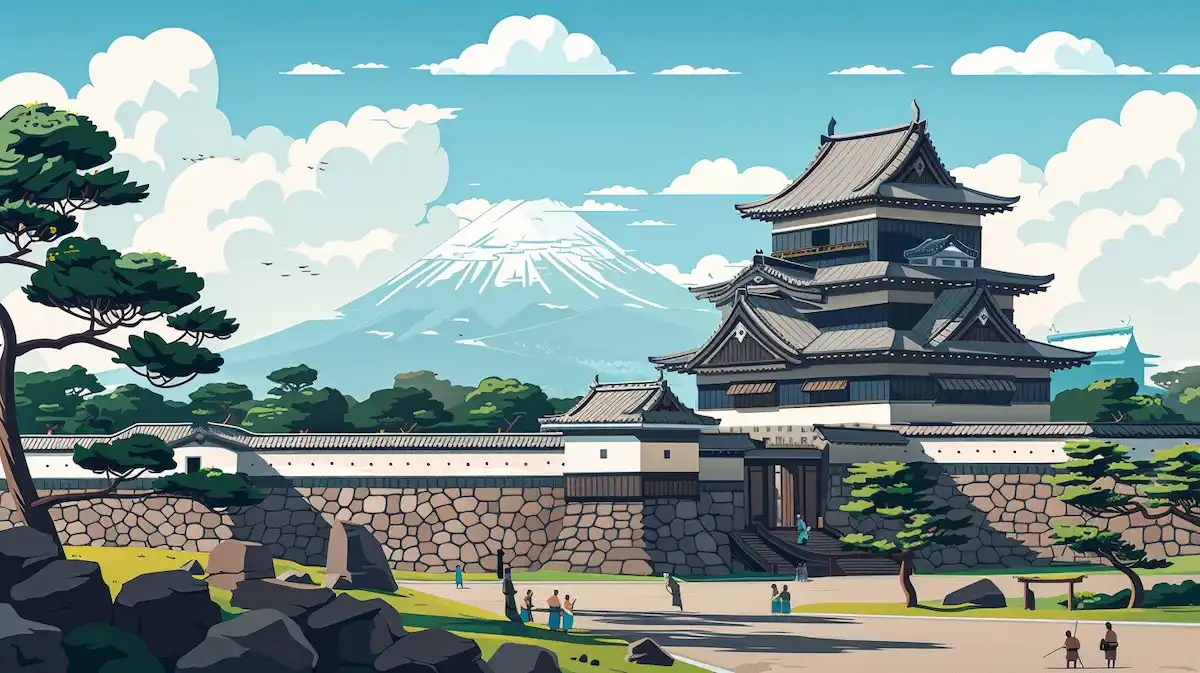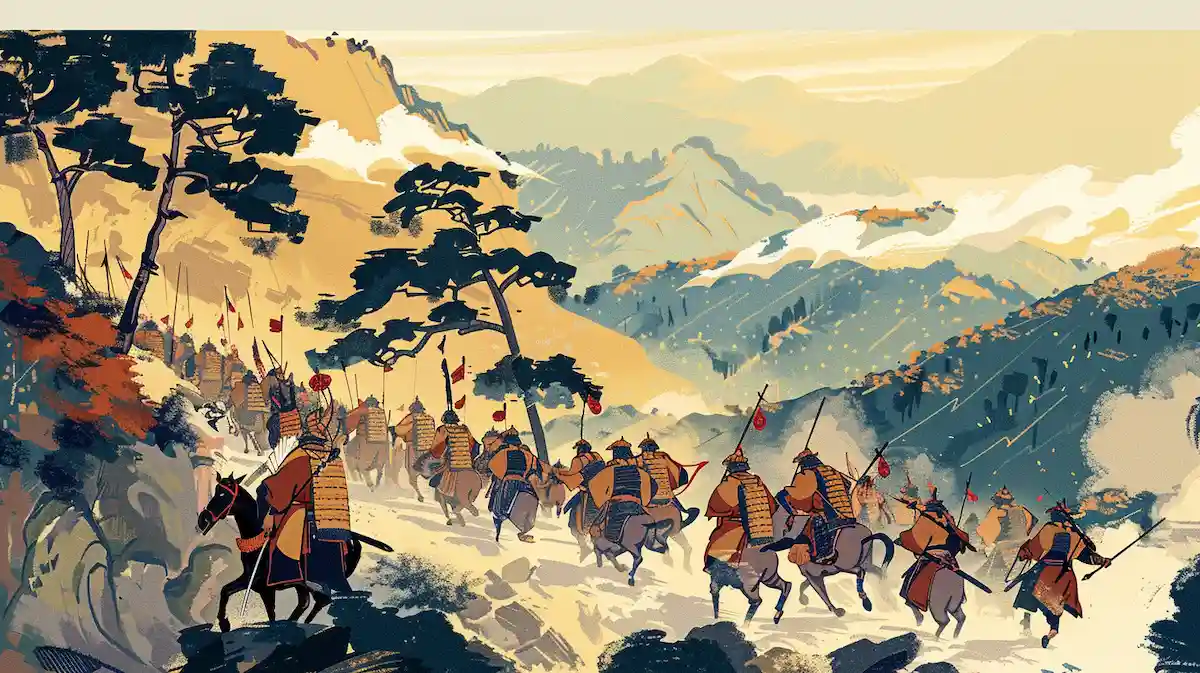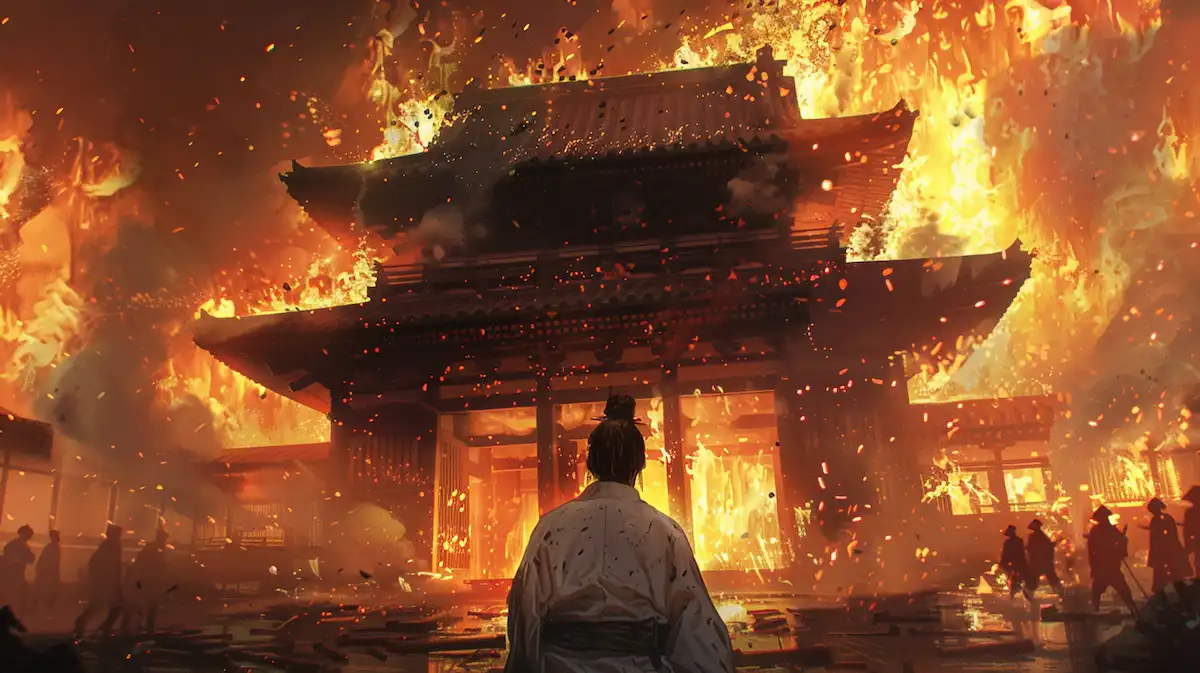織田信長を英語で説明・紹介するための基本情報と、英会話に役立つ表現をシンプルでわかりやすい英語で紹介します。
英会話ダイアローグ・概要・10の質問・詳細情報を通して、織田信長に関する英語表現を学びます。
英語
英会話ダイアローグを読む前に知っておくと良い前提知識と情報は以下の通りです。
- 織田信長の基本情報
- 生涯: 織田信長(1534年 – 1582年)は戦国時代の大名、尾張国(現在の愛知県)出身
- 目標: 全国統一を目指し、多くの戦いに勝利して勢力を拡大
- 最期: 1582年、本能寺の変で家臣の明智光秀に裏切られ、自害
- 主要な業績
- 桶狭間の戦い(1560年): 少数の軍勢で大軍を打ち破った奇襲作戦
- 楽市楽座: 商業の自由化政策、経済の活性化を図った
- 鉄砲の使用: ヨーロッパから導入し、戦国時代の戦い方を変革
- 文化的貢献
- 茶道: 茶の湯(茶道)を愛し、千利休を支援
- 西洋文化の受容: ヨーロッパの宣教師や商人を受け入れ、南蛮文化や技術を導入
- スローガン
- 天下布武: 「武力で天下を治める」という信長の野望を示す
2人が織田信長について話しています。
織田信長の生涯、桶狭間の戦いや鉄砲の使用、経済政策の「楽市楽座」、「茶の湯」の千利休の支援、「天下布武」のスローガン、本能寺の変での最期、 豊臣秀吉や徳川家康が信長の志を継いだことなどを話題にしています。
会話 / dialogue

Hey Key, I’ve been really interested in Oda Nobunaga lately. Do you know much about him?

Yeah, Nobunaga is a fascinating figure. He was one of the most powerful warlords during the Sengoku period. What got you interested in him?

I read about the Battle of Okehazama where he defeated a much larger army with a surprise attack. It was incredible how he managed that.

Absolutely, that battle in 1560 really put him on the map. His use of innovative tactics was revolutionary at the time.

I also heard about his economic policies, like the Rakuichi Rakuza. What exactly was that?

Rakuichi Rakuza was a policy that allowed free trade and eliminated monopolies by merchant guilds. This helped boost the economy in his territories significantly.

That’s pretty smart. And he was open to foreign influences, right?

Yes, he welcomed European missionaries and traders. He even adopted Western technology, like firearms, which played a big role in his military campaigns.

Speaking of firearms, the Battle of Nagashino in 1575 was another example of his innovative tactics, right?

Exactly. He used gun squads effectively against the Takeda cavalry, which was a game-changer in Sengoku warfare.

He seemed really ruthless too. What about the burning of Mount Hiei?

That happened in 1571. Nobunaga attacked and burned Enryakuji Temple on Mount Hiei because they opposed him. It was a brutal but strategic move to eliminate resistance.

His death was also dramatic. Can you tell me more about the Incident at Honno-ji?

Sure. In 1582, while staying at Honno-ji Temple in Kyoto, he was betrayed by his vassal, Akechi Mitsuhide. Nobunaga, trapped and with no way out, chose to commit seppuku, taking his own life.

That’s such a tragic end. But his legacy lived on, right?

Definitely. His successors, Toyotomi Hideyoshi and Tokugawa Ieyasu, continued his work and eventually unified Japan. Nobunaga’s policies and strategies laid the foundation for a unified Japan.

What about his cultural contributions?

Nobunaga was a patron of the arts. He loved the tea ceremony and supported Sen no Rikyu, the famous tea master. He also promoted Western culture and technology, integrating them into Japanese society.

I also read about his famous sayings. One of them is “Tenka Fubu,” right?

Yes, “Tenka Fubu” means “Rule the world by force.” It reflects his ambition to unify Japan through military power.

He really was a remarkable leader. His combination of military genius, economic savvy, and cultural openness is inspiring.

Absolutely. Nobunaga’s impact on Japan is still felt today. Learning about him gives a lot of insights into how Japan transformed during that period.

Thanks for the information, Key. It’s really deepened my understanding of Oda Nobunaga.

Anytime, Mack. It’s always great to discuss such an influential figure in Japanese history.
概要 / Overview
「織田信長」について、理解を深めるための「英語での概要」です。
織田信長

Early Life
Oda Nobunaga was born in 1534 in Owari Province, which is now Aichi Prefecture. He was a warlord during the Sengoku period, a time of many wars and battles in Japan. Nobunaga was known for his ambition to unify Japan.
Major Achievements
Nobunaga is famous for his innovative military tactics. In 1560, at the Battle of Okehazama, he defeated a much larger army with a surprise attack. This victory made him very famous. He also used European firearms, which changed the way wars were fought in Japan.
Economic Reforms
Nobunaga introduced a policy called Rakuichi Rakuza. This policy allowed free trade and eliminated monopolies by merchant guilds. It helped boost the economy in his territories and made trade more active.
Cultural Contributions
Nobunaga loved the tea ceremony and supported the famous tea master Sen no Rikyu. He also welcomed European missionaries and traders, adopting Western culture and technology. This included new ideas, goods, and firearms.
Famous Saying
Nobunaga had a famous saying: “Tenka Fubu,” which means “Rule the world by force.” This reflected his ambition to unify Japan through military power.
Death and Legacy
In 1582, Nobunaga was betrayed by his vassal, Akechi Mitsuhide, and took his own life during the Incident at Honno-ji. His successors, Toyotomi Hideyoshi and Tokugawa Ieyasu, continued his work and eventually unified Japan. Nobunaga’s influence and innovations had a lasting impact on Japanese history.
10の質問 / 10 questions
「織田信長」について、理解を深めるための「英語での10の質問」です。
1: Who was Oda Nobunaga?
Oda Nobunaga was a powerful warlord during Japan's Sengoku period. He aimed to unify Japan and is known for his innovative military tactics and reforms.
2: What is Oda Nobunaga most famous for?
Oda Nobunaga is most famous for his military victories, such as the Battle of Okehazama in 1560, and for his efforts to unify Japan.
3: What was the Battle of Okehazama?
The Battle of Okehazama was a significant battle in 1560 where Nobunaga defeated a much larger army led by Imagawa Yoshimoto using a surprise attack.
4: What were Nobunaga's economic reforms?
Nobunaga introduced the Rakuichi Rakuza policy, which allowed free trade and eliminated monopolies by merchant guilds, helping boost the economy in his territories.
5: How did Nobunaga use firearms in battle?
Nobunaga effectively used firearms, especially in the Battle of Nagashino in 1575, where his gun squads defeated the powerful Takeda cavalry.
6: What role did European missionaries play in Nobunaga's time?
European missionaries introduced Christianity and Western technology to Japan. Nobunaga welcomed them and adopted some Western influences, including firearms.
7: What does "Tenka Fubu" mean?
"Tenka Fubu" means "Rule the world by force." It was Nobunaga's slogan, reflecting his ambition to unify Japan through military power.
8: What was the Incident at Honno-ji?
The Incident at Honno-ji occurred in 1582 when Nobunaga was betrayed by his vassal Akechi Mitsuhide. Nobunaga, trapped in a temple, took his own life.
9: How did Nobunaga contribute to Japanese culture?
Nobunaga supported the tea ceremony and patronized Sen no Rikyu. He also integrated Western culture and technology into Japan, including new ideas and goods.
10: Who continued Nobunaga's work after his death?
After Nobunaga's death, Toyotomi Hideyoshi and Tokugawa Ieyasu continued his work, eventually unifying Japan and establishing lasting peace.
和訳付
会話 / dialogue

Hey Key, I’ve been really interested in Oda Nobunaga lately. Do you know much about him?
キー、最近織田信長にすごく興味があるんだ。彼について詳しい?

Yeah, Nobunaga is a fascinating figure. He was one of the most powerful warlords during the Sengoku period. What got you interested in him?
うん、信長はすごく興味深い人物だよ。戦国時代の最強の大名の一人だったんだ。どうして興味を持ったの?

I read about the Battle of Okehazama where he defeated a much larger army with a surprise attack. It was incredible how he managed that.
桶狭間の戦いについて読んだんだけど、彼は奇襲でずっと大きな軍を打ち破ったんだよね。それが本当にすごいと思ったんだ。

Absolutely, that battle in 1560 really put him on the map. His use of innovative tactics was revolutionary at the time.
その通り、1560年のその戦いで彼の名が広まったんだ。彼の革新的な戦術は当時としては画期的だったよ。

I also heard about his economic policies, like the Rakuichi Rakuza. What exactly was that?
それに楽市楽座みたいな経済政策についても聞いたことがあるんだけど、それって具体的に何?

Rakuichi Rakuza was a policy that allowed free trade and eliminated monopolies by merchant guilds. This helped boost the economy in his territories significantly.
楽市楽座は自由な取引を認めて、商人ギルドの独占を廃止する政策だよ。これによって彼の領地の経済が大きく活性化したんだ。

That’s pretty smart. And he was open to foreign influences, right?
それは賢いね。それに彼は外国の影響にも寛容だったんだよね?

Yes, he welcomed European missionaries and traders. He even adopted Western technology, like firearms, which played a big role in his military campaigns.
そうだよ、彼はヨーロッパの宣教師や商人を歓迎していたんだ。それに火器のような西洋の技術も取り入れて、軍事作戦で大きな役割を果たしたんだ。

Speaking of firearms, the Battle of Nagashino in 1575 was another example of his innovative tactics, right?
火器と言えば、1575年の長篠の戦いも彼の革新的な戦術の例だよね?

Exactly. He used gun squads effectively against the Takeda cavalry, which was a game-changer in Sengoku warfare.
その通り。彼は武田軍の騎馬隊に対して効果的に鉄砲隊を使ったんだ。これは戦国時代の戦い方を変える出来事だったよ。

He seemed really ruthless too. What about the burning of Mount Hiei?
彼は本当に冷酷だったみたいだね。比叡山の焼き討ちはどう?

That happened in 1571. Nobunaga attacked and burned Enryakuji Temple on Mount Hiei because they opposed him. It was a brutal but strategic move to eliminate resistance.
それは1571年に起こったことだよ。信長は自分に反抗した比叡山延暦寺を攻撃して焼き討ちにしたんだ。これは残酷だけど戦略的な動きだったんだ。

His death was also dramatic. Can you tell me more about the Incident at Honno-ji?
彼の最期も劇的だったよね。本能寺の変について詳しく教えてくれる?

Sure. In 1582, while staying at Honno-ji Temple in Kyoto, he was betrayed by his vassal, Akechi Mitsuhide. Nobunaga, trapped and with no way out, chose to commit seppuku, taking his own life.
もちろん。1582年に京都の本能寺に滞在中、家臣の明智光秀に裏切られたんだ。逃げ場を失った信長は自ら命を絶つことを選んだんだよ。

That’s such a tragic end. But his legacy lived on, right?
それは本当に悲劇的な結末だね。でも彼の遺産は続いたんだよね?

Definitely. His successors, Toyotomi Hideyoshi and Tokugawa Ieyasu, continued his work and eventually unified Japan. Nobunaga’s policies and strategies laid the foundation for a unified Japan.
そうだよ。彼の後継者である豊臣秀吉と徳川家康が彼の仕事を引き継ぎ、最終的に日本を統一したんだ。信長の政策や戦略は日本統一の基盤を築いたんだ。

What about his cultural contributions?
彼の文化的な貢献についてはどう?

Nobunaga was a patron of the arts. He loved the tea ceremony and supported Sen no Rikyu, the famous tea master. He also promoted Western culture and technology, integrating them into Japanese society.
信長は芸術の後援者だったんだ。彼は茶道を愛し、有名な茶人である千利休を支援したんだ。それに西洋文化や技術も取り入れて日本社会に統合したんだよ。

I also read about his famous sayings. One of them is “Tenka Fubu,” right?
彼の有名な格言についても読んだよ。「天下布武」のことだよね?

Yes, “Tenka Fubu” means “Rule the world by force.” It reflects his ambition to unify Japan through military power.
そう、「天下布武」は「武力で世界を治める」という意味だよ。これは彼が軍事力で日本を統一しようとする野望を表しているんだ。

He really was a remarkable leader. His combination of military genius, economic savvy, and cultural openness is inspiring.
彼は本当に素晴らしいリーダーだったね。彼の軍事的天才、経済的な賢さ、そして文化的な開放性の組み合わせはとても感動的だよ。

Absolutely. Nobunaga’s impact on Japan is still felt today. Learning about him gives a lot of insights into how Japan transformed during that period.
その通り。信長の日本への影響は今でも感じられるよ。彼について学ぶことで、当時の日本がどのように変わったかがよくわかるんだ。

Thanks for the information, Key. It’s really deepened my understanding of Oda Nobunaga.
教えてくれてありがとう、キー。おかげで織田信長についての理解が深まったよ。

Anytime, Mack. It’s always great to discuss such an influential figure in Japanese history.
いつでもどういたしまして、マック。日本の歴史に影響を与えた人物について話すのはいつも楽しいよ。
概要 / Overview
織田信長

Early Life
Oda Nobunaga was born in 1534 in Owari Province, which is now Aichi Prefecture. He was a warlord during the Sengoku period, a time of many wars and battles in Japan. Nobunaga was known for his ambition to unify Japan.
織田信長は1534年に尾張国(現在の愛知県)で生まれました。彼は戦国時代、つまり日本で多くの戦争や戦いがあった時期の大名でした。信長は日本を統一しようという野望で知られていました。
Major Achievements
Nobunaga is famous for his innovative military tactics. In 1560, at the Battle of Okehazama, he defeated a much larger army with a surprise attack. This victory made him very famous. He also used European firearms, which changed the way wars were fought in Japan.
信長は革新的な軍事戦術で有名です。1560年の桶狭間の戦いで、彼は奇襲攻撃ではるかに大きな軍隊を打ち破りました。この勝利で彼は非常に有名になりました。彼はまたヨーロッパの火器を使用し、日本の戦争の戦い方を変えました。
Economic Reforms
Nobunaga introduced a policy called Rakuichi Rakuza. This policy allowed free trade and eliminated monopolies by merchant guilds. It helped boost the economy in his territories and made trade more active.
信長は楽市楽座という政策を導入しました。この政策は自由な取引を認め、商人ギルドによる独占を廃止しました。これにより、彼の領地の経済が活性化し、貿易がより活発になりました。
Cultural Contributions
Nobunaga loved the tea ceremony and supported the famous tea master Sen no Rikyu. He also welcomed European missionaries and traders, adopting Western culture and technology. This included new ideas, goods, and firearms.
信長は茶の湯を愛し、有名な茶人千利休を支援しました。彼はまたヨーロッパの宣教師や商人を歓迎し、西洋の文化や技術を取り入れました。これには新しいアイデア、商品、火器が含まれます。
Famous Saying
Nobunaga had a famous saying: “Tenka Fubu,” which means “Rule the world by force.” This reflected his ambition to unify Japan through military power.
信長には「天下布武」という有名な格言があり、これは「武力で世界を治める」という意味です。これは軍事力を通じて日本を統一しようとする彼の野望を反映しています。
Death and Legacy
In 1582, Nobunaga was betrayed by his vassal, Akechi Mitsuhide, and took his own life during the Incident at Honno-ji. His successors, Toyotomi Hideyoshi and Tokugawa Ieyasu, continued his work and eventually unified Japan. Nobunaga’s influence and innovations had a lasting impact on Japanese history.
1582年、信長は家臣の明智光秀に裏切られ、本能寺の変で自害しました。彼の後継者である豊臣秀吉と徳川家康は彼の業績を引き継ぎ、最終的に日本を統一しました。信長の影響と革新は日本の歴史に永続的な影響を与えました。
10の質問 / 10 questions
1: Who was Oda Nobunaga?
織田信長とは誰ですか?
Oda Nobunaga was a powerful warlord during Japan's Sengoku period. He aimed to unify Japan and is known for his innovative military tactics and reforms.
織田信長は日本の戦国時代に活躍した強力な大名でした。彼は日本を統一することを目指し、革新的な軍事戦術や改革で知られています。
2: What is Oda Nobunaga most famous for?
織田信長は何で最も有名ですか?
Oda Nobunaga is most famous for his military victories, such as the Battle of Okehazama in 1560, and for his efforts to unify Japan.
織田信長は、1560年の桶狭間の戦いなどの軍事的勝利と、日本を統一しようとする努力で最も有名です。
3: What was the Battle of Okehazama?
桶狭間の戦いとは何ですか?
The Battle of Okehazama was a significant battle in 1560 where Nobunaga defeated a much larger army led by Imagawa Yoshimoto using a surprise attack.
桶狭間の戦いは、1560年に信長が今川義元率いるはるかに大きな軍を奇襲で打ち破った重要な戦いです。
4: What were Nobunaga's economic reforms?
信長の経済改革とは何ですか?
Nobunaga introduced the Rakuichi Rakuza policy, which allowed free trade and eliminated monopolies by merchant guilds, helping boost the economy in his territories.
信長は楽市楽座政策を導入し、自由な取引を認めて商人ギルドの独占を廃止し、彼の領地の経済を活性化させました。
5: How did Nobunaga use firearms in battle?
信長はどのように戦闘で火器を使用しましたか?
Nobunaga effectively used firearms, especially in the Battle of Nagashino in 1575, where his gun squads defeated the powerful Takeda cavalry.
信長は火器を効果的に使用し、特に1575年の長篠の戦いで鉄砲隊が強力な武田騎馬隊を打ち破りました。
6: What role did European missionaries play in Nobunaga's time?
信長の時代にヨーロッパの宣教師はどのような役割を果たしましたか?
European missionaries introduced Christianity and Western technology to Japan. Nobunaga welcomed them and adopted some Western influences, including firearms.
ヨーロッパの宣教師は日本にキリスト教と西洋の技術を紹介しました。信長は彼らを歓迎し、火器を含む一部の西洋文化を取り入れました。
7: What does "Tenka Fubu" mean?
「天下布武」とはどういう意味ですか?
"Tenka Fubu" means "Rule the world by force." It was Nobunaga's slogan, reflecting his ambition to unify Japan through military power.
「天下布武」とは「武力で世界を治める」という意味です。これは信長のスローガンであり、軍事力で日本を統一しようとする彼の野望を表しています。
8: What was the Incident at Honno-ji?
本能寺の変とは何ですか?
The Incident at Honno-ji occurred in 1582 when Nobunaga was betrayed by his vassal Akechi Mitsuhide. Nobunaga, trapped in a temple, took his own life.
本能寺の変は1582年に起こり、信長が家臣の明智光秀に裏切られ、寺に閉じ込められた信長が自害した事件です。
9: How did Nobunaga contribute to Japanese culture?
信長は日本文化にどのように貢献しましたか?
Nobunaga supported the tea ceremony and patronized Sen no Rikyu. He also integrated Western culture and technology into Japan, including new ideas and goods.
信長は茶道を支援し、千利休を後援しました。また、新しいアイデアや商品を含む西洋の文化と技術を日本に取り入れました。
10: Who continued Nobunaga's work after his death?
信長の死後、誰が彼の仕事を引き継ぎましたか?
After Nobunaga's death, Toyotomi Hideyoshi and Tokugawa Ieyasu continued his work, eventually unifying Japan and establishing lasting peace.
信長の死後、豊臣秀吉と徳川家康が彼の仕事を引き継ぎ、最終的に日本を統一し、長期的な平和を確立しました。
words & phrases
英会話ダイアローグと関連情報に出てきた単語・フレーズです(例文は各3つ)。

missionary : 名詞
意味: 宣教師。宗教を広めるために派遣される人。A person sent on a religious mission, especially one sent to promote Christianity in a foreign country.
(織田信長がヨーロッパの宣教師を歓迎し、西洋文化を取り入れたことを指す)
例文:
- The missionary traveled to many countries to spread his faith.
「その宣教師は信仰を広めるために多くの国を旅しました。」 - She worked as a missionary in Africa for many years.
「彼女は長年アフリカで宣教師として働いていました。」 - The missionary introduced new ideas and technologies to the local people.
「その宣教師は地元の人々に新しいアイデアや技術を紹介しました。」
squad : 名詞
意味: 小隊、分隊。特定の任務を持った小規模のグループ。A small group of people having a particular task.
(織田信長が長篠の戦いで鉄砲隊を効果的に使ったことを指す)
例文:
- The rescue squad arrived quickly at the scene.
「救助隊は現場にすぐに到着しました。」 - Each squad has a specific role in the operation.
「それぞれの分隊には作戦で特定の役割があります。」 - The football squad trained hard for the upcoming match.
「サッカーのチームは次の試合に向けて一生懸命練習しました。」
cavalry : 名詞
意味: 騎兵隊。馬に乗って戦う軍隊。Soldiers who fight on horseback.
(織田信長が長篠の戦いで武田軍の騎馬隊に対して鉄砲隊を使用したことを指す)
例文:
- The cavalry charged towards the enemy lines.
「騎兵隊は敵の陣地に向かって突撃しました。」 - In medieval times, the cavalry was a crucial part of the army.
「中世では、騎兵隊は軍の重要な部分でした。」 - The cavalry units were known for their speed and mobility.
「騎兵隊はその速さと機動性で知られていました。」
vassal : 名詞
意味: 家臣、封臣。領主に忠誠を誓う人。A person who has entered into a mutual obligation to a lord or monarch, often in exchange for land.
(織田信長が家臣の明智光秀に裏切られたことを指す)
例文:
- The vassal swore loyalty to his lord.
「家臣は領主に忠誠を誓いました。」 - In return for protection, the vassal provided military service.
「保護の代わりに、家臣は軍事奉仕を提供しました。」 - The vassal managed the land given to him by the king.
「家臣は王から与えられた土地を管理しました。」
savvy : 名詞
意味: 知識、理解。Practical knowledge and ability.
(織田信長の経済的な賢さを指す)
例文:
- You need to be tech-savvy to work in this field.
「この分野で働くには技術に詳しくないといけません。」 - She has a lot of business savvy.
「彼女はビジネスの知識が豊富です。」 - His political savvy helped him win the election.
「彼の政治的な知識が彼の選挙勝利に役立ちました。」
詳細情報 / Further Info
桶狭間の戦い

Background of the Battle
The Battle of Okehazama took place in 1560 during Japan’s Sengoku period, a time of many wars between powerful warlords. Oda Nobunaga, a smaller regional lord, faced Imagawa Yoshimoto, who was a much stronger and larger force. Imagawa’s army was advancing toward Kyoto, planning to conquer more territory.
桶狭間の戦いは、1560年に日本の戦国時代に起こりました。この時代は、強力な大名たちが数多くの戦争を繰り広げていた時期です。織田信長は比較的小さな地域の領主でしたが、より大規模で強力な今川義元と対峙していました。今川軍は京都に向かって進軍し、さらなる領地を征服する計画を立てていました。
Nobunaga’s Strategy
Oda Nobunaga used an unexpected strategy to surprise his enemy. Knowing he was outnumbered, he decided to launch a surprise attack on Imagawa’s camp during heavy rain. Nobunaga’s forces moved quickly and caught Imagawa’s army off guard, creating confusion and chaos.
織田信長は予想外の戦術を使って敵を驚かせました。自軍の数が劣っていることを知っていた信長は、大雨の中で今川軍の陣地に奇襲をかけることを決断しました。信長の軍は素早く行動し、今川軍を不意に襲って混乱と混沌を引き起こしました。
The Outcome and Importance
Nobunaga’s surprise attack was successful, and Imagawa Yoshimoto was killed in the battle. This victory made Nobunaga famous and showed his skill in using unique tactics. The Battle of Okehazama is remembered as a turning point in Nobunaga’s rise to power and as a bold example of strategic thinking during Japan’s Sengoku period.
信長の奇襲は成功し、今川義元はこの戦いで討ち取られました。この勝利により信長は有名になり、独自の戦術を使いこなす能力が示されました。桶狭間の戦いは、信長が勢力を拡大する転機として記憶され、日本の戦国時代における大胆な戦略の例とされています。
長篠の戦い

Background of the Battle
The Battle of Nagashino took place in 1575 during Japan’s Sengoku period. This battle was fought between Oda Nobunaga, along with his ally Tokugawa Ieyasu, and the Takeda clan, led by Takeda Katsuyori. The Takeda clan was known for its strong cavalry, which had been very effective in previous battles. Takeda Katsuyori attacked Nagashino Castle, which was under siege, forcing Nobunaga and Ieyasu to respond.
長篠の戦いは、1575年に日本の戦国時代に行われました。この戦いは、織田信長とその同盟者である徳川家康が、武田勝頼率いる武田家と戦ったものです。武田家は強力な騎馬隊で知られており、過去の戦いで非常に効果的でした。武田勝頼が長篠城を攻撃し包囲したことで、信長と家康は対応を迫られました。
Nobunaga’s Tactics
Nobunaga used innovative tactics in this battle. He set up wooden barricades and positioned large groups of gunners behind them. The gunners used matchlock firearms, which Nobunaga had introduced from Europe. By rotating gunmen in waves, he kept continuous fire on the Takeda cavalry, weakening their famous charge.
信長はこの戦いで革新的な戦術を用いました。彼は木製の柵を設置し、その背後に多数の銃兵を配置しました。銃兵たちは、信長がヨーロッパから導入した火縄銃を使用しました。銃兵を交代で配置することで、絶え間なく武田騎馬隊に銃撃を加え、その有名な突撃を弱体化させました。
The Outcome and Significance
Nobunaga’s tactics were highly effective, and the Takeda forces suffered heavy losses. This victory weakened the Takeda clan significantly and increased Nobunaga’s reputation as a brilliant strategist. The Battle of Nagashino is remembered as a key moment in the use of firearms in Japanese warfare and marked the decline of traditional cavalry tactics.
信長の戦術は非常に効果的で、武田軍は大きな損害を受けました。この勝利により、武田家の勢力は大きく衰退し、信長は優れた戦略家としての評判を高めました。長篠の戦いは、日本の戦争で火器が重要な役割を果たした瞬間として記憶され、伝統的な騎馬戦術の衰退を示すものとなりました。
比叡山の焼き討ち

Background of Mount Hiei
Mount Hiei is located near Kyoto and is known for its Enryaku-ji Temple, which was a powerful center of Buddhism during Japan’s medieval period. The temple was home to many warrior monks called “sōhei,” who often held political influence. By the 1570s, Enryaku-ji Temple and its monks opposed Oda Nobunaga’s plans to unify Japan, as they held alliances with some of Nobunaga’s rivals.
比叡山は京都の近くにあり、中世の日本では仏教の強力な拠点であった延暦寺で知られています。この寺には「僧兵」と呼ばれる多くの武装した僧侶がいて、しばしば政治的な影響力を持っていました。1570年代には、延暦寺とその僧侶たちは織田信長の日本統一の計画に反対し、信長の敵対者と同盟を結んでいました。
Nobunaga’s Decision
In 1571, Nobunaga made a bold and ruthless decision. He ordered an attack on Mount Hiei to eliminate resistance from the warrior monks. His forces surrounded the mountain and set fire to the temple and its buildings, destroying much of Enryaku-ji. Nobunaga believed this action was necessary to remove any threats to his rule.
1571年、信長は大胆で冷酷な決断を下しました。彼は僧兵たちの抵抗を排除するために比叡山への攻撃を命じたのです。信長の軍は山を包囲し、寺やその建物に火を放ち、延暦寺の多くを破壊しました。信長は、自らの統治に対する脅威を取り除くためにこの行動が必要だと考えていました。
Outcome and Legacy
The burning of Mount Hiei shocked many people, as temples were usually respected as sacred places. Nobunaga’s actions showed his determination to unify Japan at any cost. While this act was brutal, it helped him eliminate a major opponent. This event is remembered as one of the more controversial and decisive moments in Nobunaga’s campaign to control Japan.
比叡山の焼き討ちは多くの人々に衝撃を与えました。寺院は通常、神聖な場所として尊重されていたからです。信長の行動は、どんな犠牲を払ってでも日本を統一しようとする決意を示しました。この行動は残酷でしたが、大きな敵を排除するのに役立ちました。この出来事は、信長が日本を支配するための戦いにおける最も論争的で決定的な瞬間の一つとして記憶されています。
楽市楽座

What is Rakuichi Rakuza?
Rakuichi Rakuza was an economic policy introduced by Oda Nobunaga during the Sengoku period. The term means “Free Markets, Free Guilds.” Nobunaga wanted to encourage trade and make his territories more prosperous, so he removed restrictions on merchants and allowed them to trade freely.
楽市楽座は、戦国時代に織田信長が導入した経済政策です。この言葉は「自由市場、自由座」を意味します。信長は貿易を促進し、自分の領地をより豊かにすることを望んでいたため、商人への規制を撤廃し、自由な取引を認めました。
How Rakuichi Rakuza Worked
Before Rakuichi Rakuza, merchants had to belong to specific guilds, which had special rights and controlled trade in cities. Nobunaga’s policy removed these guild monopolies, meaning anyone could do business, regardless of guild membership. This policy created open markets, which made trade more competitive and accessible.
楽市楽座の導入前は、商人は特定のギルドに属する必要があり、ギルドが都市での貿易を支配していました。信長の政策はこれらのギルドの独占を廃止し、ギルドの所属に関係なく誰でも商売ができるようにしました。この政策により、競争力のある開かれた市場が生まれ、取引がより容易に行われるようになりました。
Importance of Rakuichi Rakuza
Rakuichi Rakuza helped Nobunaga’s territories become wealthier and more economically active. This policy was innovative for its time and helped to create a more modern economy in Japan. Nobunaga’s policy of free trade influenced later leaders and helped to improve Japan’s overall economy.
楽市楽座は信長の領地をより豊かにし、経済活動を活発にしました。この政策は当時としては革新的で、日本の経済をより近代化するのに役立ちました。信長の自由貿易の方針は後の指導者たちにも影響を与え、日本全体の経済向上に寄与しました。
本能寺の変

Background of the Incident
The Incident at Honno-ji occurred in 1582 during Japan’s Sengoku period. Oda Nobunaga, who was close to achieving his goal of unifying Japan, was staying at Honno-ji Temple in Kyoto. At that time, Nobunaga was one of the most powerful warlords in Japan, and his influence continued to grow.
本能寺の変は、1582年の日本の戦国時代に起こりました。日本統一の目標に近づいていた織田信長は、京都の本能寺に滞在していました。当時、信長は日本で最も強力な大名の一人であり、その影響力は増し続けていました。
Betrayal by Akechi Mitsuhide
Akechi Mitsuhide, one of Nobunaga’s trusted vassals, suddenly turned against him. Mitsuhide led his army to Kyoto and attacked Honno-ji Temple, where Nobunaga was staying with only a small group of guards. Surprised and outnumbered, Nobunaga had no way to escape.
信長の信頼していた家臣の一人である明智光秀が突然、彼に反旗を翻しました。光秀は軍を率いて京都に向かい、少人数の護衛と共に滞在していた本能寺を攻撃しました。不意を突かれ、数でも劣勢だった信長には逃げ場がありませんでした。
Nobunaga’s Death and Its Impact
With no other choice, Nobunaga chose to end his own life, a practice called “seppuku.” The Incident at Honno-ji shocked Japan and marked the end of Nobunaga’s rule. His death left a power vacuum, leading to a period of struggle before his successors, Toyotomi Hideyoshi and Tokugawa Ieyasu, eventually unified Japan.
逃げ場がなくなった信長は、自ら命を絶つことを選びました。これは「切腹」と呼ばれる行為です。本能寺の変は日本に大きな衝撃を与え、信長の支配の終わりを告げるものでした。信長の死によって権力の空白が生じ、その後、豊臣秀吉と徳川家康が最終的に日本を統一するまでの争いの時代が続きました。
関連記事(徳川家康、豊臣秀吉)


